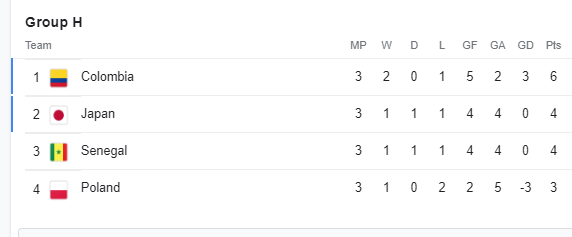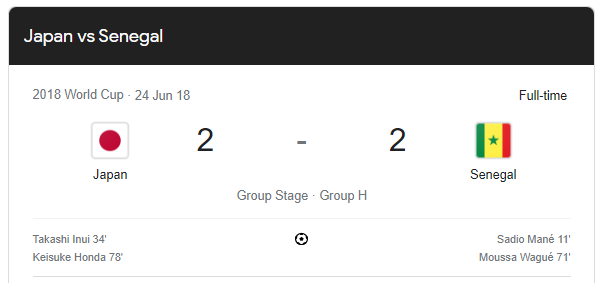The World Cup is undoubtedly the biggest and most heavily-followed soccer competition of all time as it brings together national football teams from all over the world to battle it out for arguably the most coveted prize of the sport. Due to its highly competitive nature, no team can afford a misstep at any stage – be it the group stages where only the top two teams advance, the knockout stages where defeat means the end of their journey, or the latter stages like the semi-finals or finals where players either earn the right to have their names etched in the annals of soccer history or become cautionary examples of glory denied. There are however instances where teams are so evenly matched that the smallest of technicalities have to be used to separate them.
When did Senegal go out of the World Cup on yellow cards? Senegal went out of the World Cup on yellow cards in the group stages of its 2018 edition in Russia. The contentious decision made the Lions of Teranga the first team in the history of the competition to succumb to FIFA’s controversial fair play rules allowing Japan to proceed to the Round of 16 after registering similar results in every distinguishing category.

A Brief History of Senegal at International Competitions
Over the past three decades, Senegal has established itself as one of the top teams in the Confederation of African Football (CAF) and a perennial contender in the bi-annual Africa Cup of Nations competition (AFCON).
Despite the talented squads the Lions have had over the years, the team had generally had mixed to poor fortunes in AFCON competitions until they won their maiden title in 2021 by beating seven-time champions Egypt 4-2 on penalties.
The World Cup has however always been much kinder to Senegal and to date, the team is arguably one of if not the most successful African countries despite only having qualified for the competition thrice (2002, 2018, and 2022).
Senegal made history at the 2002 World Cup by becoming the second African team to make it to the quarter-finals of the tournament. They did so by first beating then-defending champions France in their opening match, drawing with Uruguay and Denmark to book their ticket out of the group stages, and then beating Sweden in extra time in their round of 16 clash.
Their 2022 World Cup campaign was equally successful. After starting out on faulty footing by losing their opener to the Netherlands, Senegal redeemed themselves by beating hosts Qatar and Ecuador to make it through to the Round of 16.
Their progress was however cut short by England who beat the undermanned side 3-0. Many sports pundits argue that Senegal may have put up a better showing had they had the services of talismanic marksman Sadio Mané who missed the tournament due to injury.
How and When FIFA’s Fair Play Rules Work
FIFA traditionally has eight rules that dictate the criteria that teams have to meet in order to progress in their competitions such as the World Cup. The eight rules are essentially tiebreakers. Fair play rules come into force when the first six rules fail to provide a clear “winner”.
The above-mentioned six rules are as follows:
- Total points accumulated in group matches – teams earn three points for a win, a point for a draw, and zero points for a loss. The top two teams with the most points then progress to the next round.
- Goal difference – where two or more teams are tied on points, the team with the greatest goal difference from all their group matches is allowed to progress.
- Goals scored – if two or more teams remain tied after the goal difference is considered, officials consider the total number of goals scored in all group matches by the teams in question. The team with the higher number of goals scored is then allowed to proceed.
- Total points in head-to-head matches – if two or more teams are still tied at this juncture, officials consider the number of points accrued in the matches played between the teams in question. The team with the highest number of points then proceeds.
- Goal difference in head-to-head matches – in case there is a stalemate after the four criteria above are considered, officials then consider the goal difference from the matches between the tied teams. The team with the higher goal difference is then allowed to proceed.
- Goals scored in head-to-head matches – if two or more teams remain tied, the total number of goals scored in the matches between the tied teams will be considered. The team with the higher number of goals scored will then be allowed to proceed.
If two or more teams are tied after the six criteria above are exhausted, FIFA’s fair play rules, which act as the seventh criterion, are used as a tiebreaker. Simply put, the fair play rules are a point system that deducts a prescribed number of points for yellow and red card offenses as follows:
Yellow card – minus one point
Indirect red card/second yellow card – minus three points
Direct red card – minus four points
Yellow card and direct red card – minus five points
In order to ensure fairness, only one of the above deductions is applied to a player in a match. The fair play rules also exclusively apply to the group stages as the knockout stages provide other avenues for deciding a winner in case of a tie (extra time and penalties).
In the event that two or more teams are tied even after the fair play rules are considered, the eighth and final tiebreaker comes into effect – the FIFA Organizing Committee for the respective World Cup competition draws lots to decide which of the teams in question proceeds. There however hasn’t been an instance where all the first seven criteria have been exhausted.
Making History for All the Wrong Reasons
At the 2018 World Cup, Senegal and Japan won their first matches against Poland and Columbia respectively by a similar margin of 2-1. The two teams then drew their match 2-2 before Columbia beat Poland 3-0 to register their first group win.

Senegal and Japan then lost to Columbia and Poland respectively by a similar margin of 1-0 to leave them tied across all categories even after the first six criteria were considered. After officials considered the fair play rules, Senegal was eliminated from the competition after accruing two more yellow cards than Japan in the group stages.
The aftermath of the historic decision was met with mixed reactions. Senegal coach Aliou Cisse accepted the outcome and the use of fair play rules but reiterated that his side would have “preferred to be eliminated in another way”.
Others like veteran BBC pundit Mark Lawrenson labeled the outcome “an absolute farce” particularly because Japan threw its final group match against Poland and avoided making serious challenges in the final minutes of the fixture so as not to risk any more yellow cards.
